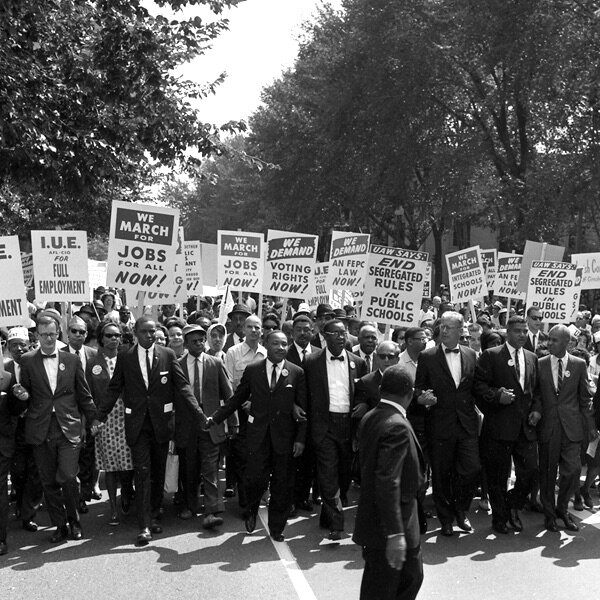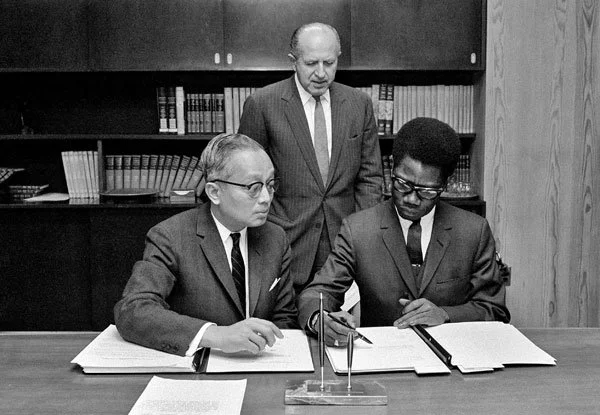Civil and Political Rights

Civil rights are the rights of each person to exist in a society without facing unfair treatment or discrimination; they ensure equal social opportunities and equal protection under the law – regardless of race, ethnicity, gender, religion, or other characteristic. Civil rights exist to protect individuals from actions by the government, organizations, or other persons.
Political rights allow individuals to participate freely in the political system. This includes voting and holding public office. Political rights are supposed to ensure that an individual can join a political party, attend a protest, or other political activities without fear of repression.
Both civil and political rights are at the core of international human rights law.
Teaching Materials
Subject(s): current events, history, social studies
What rights do we have in the workplace? And why is it important for workers to know these rights? In Strike!: Workers’ Rights & the Matchwomen of London’s East End, students have the opportunity to learn about their rights as workers, as well as an historical struggle by workers in Victorian London. They will also learn about the importance of solidarity.
Subject(s): current events, teaching tools
Published in October 2023, this brief guide offers suggestions for navigating difficult conversations about Israel and Palestine.
Subject(s): civics, history, social studies
In Liberté, Égalité, Fraternité: Citizenship & Exclusion in Revolutionary France, students explore the plight of social groups whose rights were limited or denied. In the process, they will consider who has rights in their own communities, and whether exclusion continues.
Subject(s): history, media literacy, social studies
Uncovering Misinformation: Expression, Propaganda, and Human Rights is a set of four lessons that provides teachers with resources to educate students about freedom of expression as a basic human right, misinformation, the role of the media, and propaganda. The goal is to provide opportunities for students to learn about misinformation and to develop skills to critically analyze the media that they consume.
Subject(s): civics, current events
Human Rights Are for Everyone: A Guide to Teaching for Positive Change provides an opportunity for creating a vibrant and timely training program about the Universal Declaration of Human Rights for youth and adults. It provide the tools for teaching an overview of human rights ideals and an in-depth look at the UDHR. Most importantly, this guide encourages critical thinking, collaboration, and activism.
Subject(s): current events
This lesson is designed to introduce students to international human rights standards and expose students to stories of real people who have had their rights violated and have defended their rights or the rights of others. The lesson's activities allow students to explore the Universal Declaration of Human Rights and the framework it provides in the struggle for human rights around the world.
Subject(s): current events, media, teaching tools
Explore our resource pages for each individual article of the UDHR, including lessons and related news stories.
Subject(s): history, social studies
The Stages of Genocide Toolkit is designed to help teachers cover the topic of genocide in a meaningful and incisive way. Using the “Ten Stages of Genocide” framework, it provides an opportunity to explore multiple instances of mass atrocity. The Toolkit also highlights the connection between genocide and human rights.
Subject(s): history, media, social studies
This lesson provides an opportunity to analyze primary sources from the Black Panther Party, Chairman Fred Hampton, and the Federal Bureau of Investigation’s COINTELPRO operation (1956-1971), which sought to inhibit the effectiveness of Black liberation groups and other activist organizations. These activities provide students with historical context for Judas and the Black Messiah. The lesson also includes a discussion guide for the film.
Subject(s): current events, history, social studies
The process of rebuilding after widespread human rights abuses is often referred to as transitional justice. In the wake of the genocide, Rwandans embarked on their own transitional justice process. In this lesson, students will learn about the 1994 genocide against the Tutsi in Rwanda and the ongoing process of transitional justice in the small African nation.
Subject(s): history, social studies
In this activity, students examine the petition, We Charge Genocide: The Historic Petition to the United Nations for Relief from a Crime of the United States Government Against the Negro People. Through a close reading of the petition and a class discussion, students will draw connections from the past to current headlines about racial violence and police brutality in the United States.
Subject(s): current events
Inspired by the podcast Ear Hustle, Inside/Outside/Other: Mass Incarceration in the United States asks students to examine how the dehumanization of incarcerated people, both inside and outside the four walls of prison, allows this system to keep growing.
Subject(s): current events, history, social studies
Beyond the Yellow Star: Human Rights Abuses in Nazi Germany explores the development of the Universal Declaration of Human Rights in the wake of World War II and the Holocaust. It also gives students the opportunity to engage with case studies about different human rights abuses in Nazi Germany and reflect on the place of human rights in the world today.
Subject(s): civics, current events
This lesson offers students an opportunity to learn more about the experience of refugees, migrants, and asylum-seekers as well as U.S. immigration law. Additionally, misinformation about asylum-seekers and immigrant communities is clarified with facts and personal narratives.
Subject(s): history, social studies
This lesson explores the Haitian Revolution and the long-lasting consequences of colonial domination. The Haitian Revolution is a crucial event in the stury of world history, as it provides an early example of “people power” and demonstrates that no matter how overwhelming the oppression, liberation is possible.
Subject(s): current events, history, media, social studies
This discussion guide was created for use with Ava DuVernay's Netflix limited series, When They See Us, which explores systemic and institutional racism in the U.S. through the real story of the Central Park Five, five Black and Latinx youth who were falsely accused, tried, and imprisoned for the 1989 attack of a white female jogger.
Subject(s): teaching tools
Key terms related to civil and political rights
Primary Source Documents
In his 1941 State of the Union address, President Franklin Delano Roosevelt made the case for continuing to provide material support to Britain in the fight against fascism in Europe. Arguing against isolationism, Roosevelt explained that in this support against the Axis powers, Americans would be protecting four universal rights: the freedom of speech and expression, the freedom to worship, freedom from want, and freedom from fear.
The principles of the “Four Freedoms” would eventually evolve into the United Nations Declaration of 1942 and the Universal Declaration of Human Rights (UDHR) of 1948. Roosevelt’s widow, Eleanor Roosevelt, was instrumental in the passage of the UDHR. Read document >
The Convention on the Elimination of All Forms of Racial Discrimination (CERD) was adopted by the United Nations in 1965 in response to a growing awareness of racial discrimination around the world. It defines racial discrimination as different (negative) treatment towards a person or group as a result of their national or ethnic origin. This discrimination restricts the human rights of the person/group.
Under this agreement, states are obliged to ensure equality under the law for all people, regardless of race or ethnicity. The convention also requires its parties to outlaw hate speech. CERD has gained near-universal acceptance in the international community, with 179 states being party to the convention. Read document >
The UN General Assembly adopted the International Covenant on Civil and Political Rights in 1966. It is one of three documents that make up the International Bill of Rights.
The covenant protects many important rights which limit the encroachments of government, including the right to life, freedom of speech, and the right to due process. Unlike the Universal Declaration of Human Rights, the covenant is legally-binding. It is monitored by the United Nations Human Rights Committee, which meets three times per year. Read document >
The Framework Convention for the Protection of National Minorities is a treaty of the Council of Europe aimed at protecting minority groups within Europe. Adopted in 1994, it is the world’s first legally-binding multilateral treaty to protect national minorities. The treaty does not define ‘national minority’ but instead leaves it up to each country to decide on its own definition of the term.
Parties to the convention must agree to promote the full equality of persons belonging to national minority groups in all areas of economic, social, political, public and cultural life. Read document >
Additional Resources
The following organizations are a sample of groups working to protect civil rights in American society; it is not an exhaustive list.
American Civil Liberties Union
The American Civil Liberties Union (ACLU) was founded in 1920. It works to defend and preserve the individual rights and liberties enshrined in the laws and the U.S. Constitution. The organization primarily works through litigation and lobbying, but also creates large-scale public advocacy campaigns for a number of issues.
Asian American Legal Defense and Education Fund
Founded in 1974, the Asian American Legal Defense and Education Fund (AALDEF) works to protect the civil rights of Asian Americans. Through litigation, advocacy, and education, the organization focuses on issues such as: immigrant right, voting rights, and equity in education.
Council on American-Islamic Relations
The Council on American-Islamic Relations (CAIR) is a nonprofit organization working to protect the civil rights of Muslims in the United States. It also works to enhance understanding of Islam and advocates dialogue between faith communities.
Disability Rights Advocates
Disability Rights Advocates (DRA) is one of the leading disability rights legal centers in the United States. Its mission is to advance equal rights and opportunities for people with all types of disabilities – including mobility, sensory, cognitive, and psychiatric disabilities.
Lambda Legal
Lambda Legal is a nonprofit organization working to protect the civil rights of LGBT individuals, as well as all people diagnosed with HIV. The organization works primarily through litigation, education campaigns, and public policy.
Mexican American Legal Defense and Education Fund
The Mexican American Legal Defense and Education Fund (MALDEF) is the oldest Latinx legal civil rights organization in the United States. Founded in 1968, it strives to protect and defend the rights of all Latinx individuals living in the U.S.
National Association for the Advancement of Colored People
Founded in 1909, the National Association for the Advancement of Colored People (NAACP) exists to secure the political, educational, social, and economic equality of rights in order to eliminate race-based discrimination. To these ends, it works on a number of issues, including climate justice, educational equity, and economic opportunity.
National Organization for Women
The National Organization for Women is the largest organization of feminist activists in the U.S. It works to promote feminist ideals and protect the equal rights of women. Its issue areas include reproductive rights, ending domestic violence, and constitutional equality.
Native American Rights Fund
The Native American Rights Fund (NARF), founded in 1971, provides legal representation to Native Americans and Indian tribes. It also works to ensure that the civil and religious rights of all Native Americans are respected and protected.
























Subject(s): civics, history, social studies, current events
Based on the framework provided by Timothy Snyder in On Tyranny: Twenty Lessons from the Twentieth Century, Defending Democracy offers teachers a suite of 15 lessons to support students to be promoters and defenders of democracy and human rights.